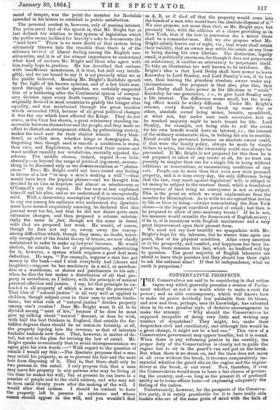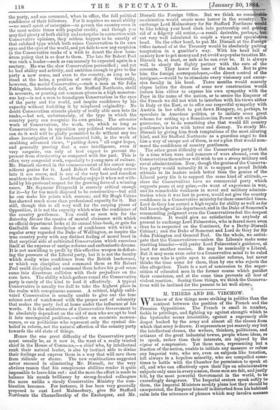CONSERVATIVE PROSPECTS.
THE Conservatives are said to be considering in that rather vague way which generally precedes a session of Parlia- ment whether or not it is worth while to make a rush for power ; and an able contemporary, which well knows how to make its praise decidedly less palatable than its blame, and now and then, perhaps, uses its knowledge, has exhorted them in its own peculiar style of derisive encouragement to make the attempt. "Why should the Conservatives be supposed incapable of doing very little and writing any number of despatches? They might, too, make their despatches civil and conciliatory, and although this would be a great change, it might not be a bad one." This view of a Conservative government may appear humble, but it is sound. When there is any reforming passion in the counlry, the proper duty of the Conservatives is clearly not to guide the engine but to sit in the guard's van and put on the break. But when there is no steam on, and the train does not move at all even without the break, it becomes comparatively fin- material whether the guard sits on the engine and the engine- driver at the break, or vice versd. Now, therefore, if ever the Conservatives would seem to have a fair chance of govern- ing the country, and—so long as the present fit of profound apathy as to home-affairs lasts—of expressing adequately the feeling of the nation. Unfortunately, however, for the prospects of the Conserva- tive party, it is rarely practicable for it to have really able leaders who are of the same grain of mind with the bulk of the party, and can command, when in office, the full political confidence of their followers. For it requires no small ability —no small spirit of enterprise—to govern the country even in the most sedate times with popular credit; and though you may find plenty of both ability and enterprise in connection with Conservative opinions, they seldom happen to be exactly of that subdued type which both raises Conservatism in its own eyes and the eyes of the world, and yet fails to sow any suspicion in the Conservative ranks of a wish to desert the slow hum- drum policy that is so dear to them. The late Sir Robert Peel was such a leader—such as can scarcely be expected again in a century. He was the slow Conservatism personified ; and yet he had ability and activity, and ambition enough to give to the party a new status, and even to the country, as long as he stood at the helm, a position of some dignity. Generally, however, the model Conservative,—such a man as Sir John Pakington, laboriously dull, or Sir Stafford Northcote, shrill in accounts, or pouring out common-places in a high monoton- ous key—is not a man to transfigure Conservatism in the eyes of the party and the world, and inspire confidence by his capacity without forfeiting it by misplaced originality. No doubt Conservatism attracts plenty of really able men into its ranks,—but not, unfortunately, of the type in which the country party can recognize its own genius. The attractive work of Conservatism, the work, too, which so long as Conservatives are in opposition any political volunteer who can do it well will be gladly permitted to do without any too close investigation of his fundamental faith, is the work of snubbing advanced views, "putting down" all eager hopes, and generally proving that a sane intelligence, even if very sanguine, can only at best expect to prevent the present from deteriorating as compared with the past. This is often very congenial work, especially to young men of culture. Mr. Disraeli showed in the commencement of his career mag- nificent genius for it. Lord Robert Cecil obviously enters into it con amore, and is one of the very best and roundest snubbers in the House. Lord Stanley enjoys it when not with- held by his profound respect for the growing force of a winning cause. Mr. Seymour Fitzgerald is scarcely critical enough for it—by far too much disposed to be constructive—but still he can make his points with success; and Sir Hugh Cairns has showed much more than professional capacity for it. But still, though this is all very well for the carping phase of Opposition, it is not the capacity which wins the confidence of the country gentlemen. You could as soon win for the Saturday Review the species of mental obeisance with which an official department looks at its annual blue-book, or gain for Garibaldi the same description of confidence with which a regular army regarded the Duke of Wellington, as inspire the true country party with any distinct feeling of moral trust in that sceptical side of cultivated Conservatism which exercises itself at the expense of unripe reforms and enthusiastic dreams. It is not unwilling to profit by this effective weapon in defeat- ing the pressure of the Liberal party, but it is not the faculty which really wins confidence from the British landowner, or which can discipline and command them as Sir Robert Peel could discipline and command them before his good sense came into disastrous collision with their prejudices on the corn laws. The ability which gathers round the Conservative party is rarely of the kind to lead it effectively. A typical Conservative is usually too dull to take the highest place in the realm with conspicuous success. A critical, highly culti- vated Conservative is usually unable to give out the true solemn sort of watchword with the proper sort of solemnity that makes the party feel at home under the influence ef his words. It is the misfortune of a Conservative Government to be absolutely dependent on the aid of men who are apt to lead it into uncongenial positions,—either on eccentric manceu- verers, or on politicians who represent only the cynical dis- belief in reform, not the natural affection of the country party towards the old state of things.
Hence the one great difficulty of the Conservative party must .usually be, as it now is, the want of a really trusted chief in the House of Commons,—a chief who, by intellectual rank their natural leader, is also by instinct able to divine their feelings and express them in a way that will save them from ridicule or shame. The new combinations suggested never succeed in eliminating Mr. Disraeli, for the very obvious reason that his conspicuous abilities render it quite impossible to leave him out : and the more the effort is made to balance his unsafe brilliancy by strong-headed colleagues the more unlike a steady Conservative Ministry the com- bination becomes. For instance, it has been very generally proposed to oust Lord Malmesbury, give Sir Stafford Northeote the Chancellorship of the Exchequer, and Mr. Disraeli the Foreign Office. But we think no con combination would create more horror in the countr exchange Lord Malmesbnry for Sir Stafford Northcote be like taking your head clerk into partnership and g rid of a fidgetty old senior,—a result desirable, perhaps not very well calculated to weight a viewy and specul head. On the other hand, to put Mr. Disraeli at the Form Office instead of at the Treasury would be absolutely putting temptation in a gambler's way. With his head full of anxiety how to get money and yet avoid unpopular taxation Mr. Disraeli is, at least, as safe as he can ever be. It is always. well to steady the flighty partner with the care of the accounts. They lower the tone of the mind. But to give- him the foreign correspondence —the direct control of the intrigues,—would be to stimulate every visionary and excur- sive faculty in his head. Three months would scarcely elapse before the dream of some new construction would induce him either to express his own sympathy with the Pope in the name of the nation, or to assure the Emperor of the French we did not wish to interfere with his views either- in Italy or the East, or to offer our respectful sympathy with. Austria in her effort to put down Hungary, or, perhaps, to. speculate in American politics, or to initiate some great scheme for setting up a Scandinavian Power with an English guarantee, or to do something else that would fill country gentlemen's hearts with terror and dismay. To steady Mr. Disraeli by giving him fresh temptations of the most alluring kind, and Sir Stafford Northcote as a guardian angel to find him a way of escape out of them, is not a plan that would com- mand the confidence of country gentlemen.
The other great difficulty of the Conservative party is that- in a time when wars and rumours of wars abound, even the Conservatives themselves will wish to see a strong military and naval administration. Now, though the genius of the Conserva- tive party would naturally fit it to support a proud British attitude in its leaders much better than the genius of the- Liberal party fits it to support the same kind of attitude, — since the Conservatives have no commercial party which supports peace at any price,—its want of experience in war,. and its remarkable weakness in naval and military adminis- tration when it was last in power, would not give the country confidence in a Conservative ministry for these unsettled times.. Lord de Grey has earned a high repute for ability as well as for full knowledge of his department, and in the Duke of Somerset's commanding judgment even the Conservatives feel the deepest confidence. It would give no satisfaction to anybody at present to exchange Lord Palmerston, who is feared more even than he is respected on the Continent, for a Derby-Disraeli Cabinet ; and the Duke of Somerset and Lord de Grey for Sir John Pakington and General Peel. On the whole, we antici- pate that the Conservatives—unless the Liberals make some startling blunder—will prefer Lord Palmerston's guidance, at least for another session. He may be nominally a Liberal. But it may seem even safer to a Conservative mind to be ruled by a man who is quite open to consider reforms, but never thinks the time come for them, than by one who rejects the idea altogether. Theie is a sort of concession to the super- stition of educated men in the former course which pacifies their conscience, and at the same time prevents all fear of violent reaction. Seeing these things, we think the Conserva- tives will be inclined for the present to let well aloneA































 Previous page
Previous page